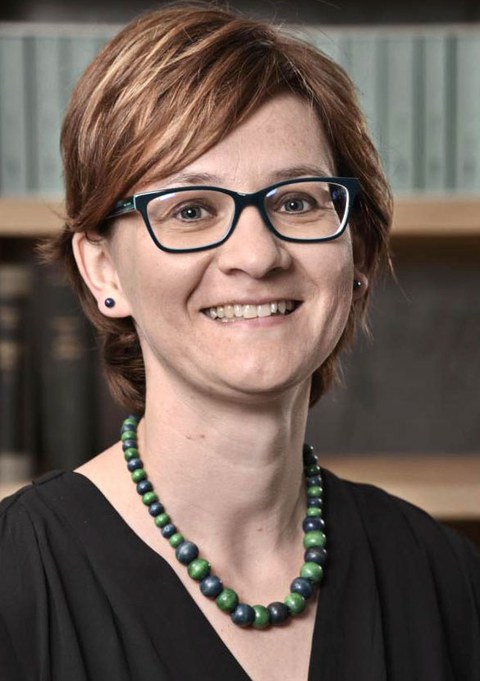From lecturer in the nursery to communications researcher
(Interview from 2018)
Dagmar Möbius
As a child, she played school with her stuffed animals and was an avid user of the city library. Dr. Doreen Reifegerste still enjoys learning and passing on her knowledge today. The communications expert researches how public health information can be communicated in an understandable way. This is why she knows why well-intentioned prevention tips are often useless, and how to really get messages across.

Dr. Doreen Reifegerste works at the Professorship for Communication Science at the University of Erfurt.
Doreen Reifegerste has been interested in human behavior since school. Originally, she wanted to become a market researcher and pollster, and tried her hand at teaching in the nursery. With an overall grade of 1.4 in her Abitur high school diploma, she qualified for a university place here in Dresden. Family in Dresden and a sense of belonging made choosing Saxony over a psychology program in Marburg a relatively easy decision. She studied on an interdisciplinary Magister degree program at TU Dresden (TUD) from 1998 to 2003, majoring in communication,with minors in psychology and economics. Doreen Reifegerste gained experience in presenting her expertise when she worked as a part-time tour guide for day trips across Germany and that experience can still be useful in seminars today.
However, when it came to the topic for her final-year dissertation, she had to work on convincing her professor, Wolfgang Donsbach (†), and bring a psychologist on board as second examiner. What was that topic? The influence of case studies on risk and efficacy assessments in health communication ("Der Einfluss von Fallbeispielen auf die Risiko- und Wirksamkeitseinschätzungen in der Gesundheitskommunikation"). Fifteen years ago, this was an underrepresented field of research, and Reifegerste introduced it to communication studies in Dresden. "I can still advise students on that area today," says the 39-year-old, who has been a research associate at the University of Erfurt's Professorship for Communication Science, with a focus on social communication since June 2018. The work she presented in 2003 on skin cancer prevention options and their impact on behavior is still used in seminars and lectures today. For example, groups of students in Erfurt are looking at what prevents outdoor workers from taking precautions to protect themselves against factors such as harmful solar radiation. Dr. Reifegerste is also working on new skin cancer prevention guidelines.
After her degree, Doreen Reifegerste was employed as a market research consultant at AOK PLUS from 2005 to 2013. "When I started there, people were not familiar with the communication degree program and it was good that I also had some business management skills on my degree certificate," she recalls. While working, she completed a three-year doctoral program at the University of Erfurt. She defended her thesis on the application of evolutionary motives to increase the target group-specific effectiveness of prevention messages ("Anwendung evolutionärer Motive zur Steigerung der zielgruppenspezifischen Wirksamkeit von Präventionsbotschaften") in 2012.
"It is often assumed that everyone wants to behave in a health-conscious way. But that is not the case," says Dr. Reifegerste. "Simply saying 'If you want to be healthy, you need to do this and this...' does not work, because of the other interests of the target groups," she explains, and gives an example: "Many people know that binge drinking is not good for you. But it still happens – because of peer pressure, or because people want to impress someone." The fact that health arguments often have little weight with young people, but that acceptance and approval are very important, is something that the German Federal Center for Health Education now factors into its campaigns. "If these barriers are not considered, many measures come to nothing," says the health communication expert. "Knowledge about health is just one part of the whole; contextualizing and applying that knowledge is also important."

The German Federal Center for Health Education focuses its prevention efforts on messages that appeal to young people.
Between 2013 and 2018, Dr. Doreen Reifegerste worked as a research associate at TUD (where she was also spokesperson for doctoral requests at the Institute of Media and Communication), at Friedrich Schiller University Jena, and in the Department of Journalism and Communication Research at Hanover University of Music, Drama and Media. "My grounding in the methodology of empirical data collection and evaluation, and the interdisciplinary, and in part applied degree in Dresden are a great help to me in my current job," she says, looking back, explaining that she is "able to work with very different disciplines and practitioners because I understand and value their different goals and approaches. At the same time, I am aware of methodological similarities and can often use them as a basis for collaboration."
Dr. Doreen Reifegerste still has links to the TUD Institute of Media and Communication. "Students I once supervised now work there as research associates, and are continuing to advance the issue of health communication." In 2014, she presented several dissertations on health communication as part of an Institute of Media and Communication Practice Forum run together with Prof. Wolfgang Donsbach and Prof. Lutz Hagen. A number of former students and university colleagues now work at AOK PLUS. "Last semester, I also had a former Bachelor's student from Dresden on the health communication Master's program in Erfurt." Not only does she do research on networking, she also worked for several years on the editorial team of the Germany-wide Netzwerkes Medien und Gesundheitskommunikation media and health communication network, which sends out a newsletter for researchers, politicians, and interested members of the public several times a year.
Dr. Doreen Reifegerste is currently researching how to ensure that health information is understood by laypeople and helps them in their everyday life. Well aware that skeptics "take communication so much for granted that they don't think it needs to be researched," she tells us that "the beauty of research is that every question you answer opens up a thousand new ones." Has she noticed any east-west differences in health communication? "Good question," she smiles. She has previously studied the history of the Deutsches Hygiene-Museum and thinks back to educational films with political messages in the GDR that could put people on the defensive when it comes to prevention messages from the state today. "There are probably structural differences between eastern and western Germany, but there is still a lot of research to be done on this topic," she believes.
Since 2017, Dr. Doreen Reifegerste has chaired the ECREA Health Communication Temporary Working Group. Founded in 2005, the European organization is dedicated to the development of communication research and higher education in Europe. Dr. Doreen Reifegerste recently co-authored "Medien und Gesundheit" with Dr. Eva Baumann. The book is aimed at freshmen, journalists, and practitioners in the health and communications sector, and brings together a wealth of media expertise on health questions. A textbook entitled "Gesundheitskommunikation: Studienkurs Medien & Kommunikation" is to be published by the end of 2018.
In another textbook that has just gone to press, Doreen Reifegerste addresses a previously neglected field: "Die Rollen der Angehörigen in der Gesundheitskommunikation: Modelle, Funktionen und Strategien" – "The roles of family members in health communication: Models, functions and strategies." This area is particularly close to her heart. "In our everyday lives, we often ignore how important social networks are," she explains. "Take young cancer patients, for example. They are now often treated as outpatients. Who is helping them to cope with their illness? How can forums, WhatsApp groups, and computer games help?" Families also play an essential role in dealing with depression and diabetes.
In the future, Dr. Doreen Reifegerste would like to see a greater appreciation of the importance of quality in health communication, more permanent posts, job security in research and academia, and "more people and more money for research" – on a project-specific basis if appropriate. Anyone interested can also contact her directly to volunteer for research.
Contact:
Dr. Doreen Reifegerste
wiss. MA Professur Kommunikationswissenschaft
mit Schwerpunkt Soziale Kommunikation
Nordhäuser Str. 63
99089 Erfurt
Tel.: +49 361 737 41 77 (by appointment)
Email
Back to the portraits

